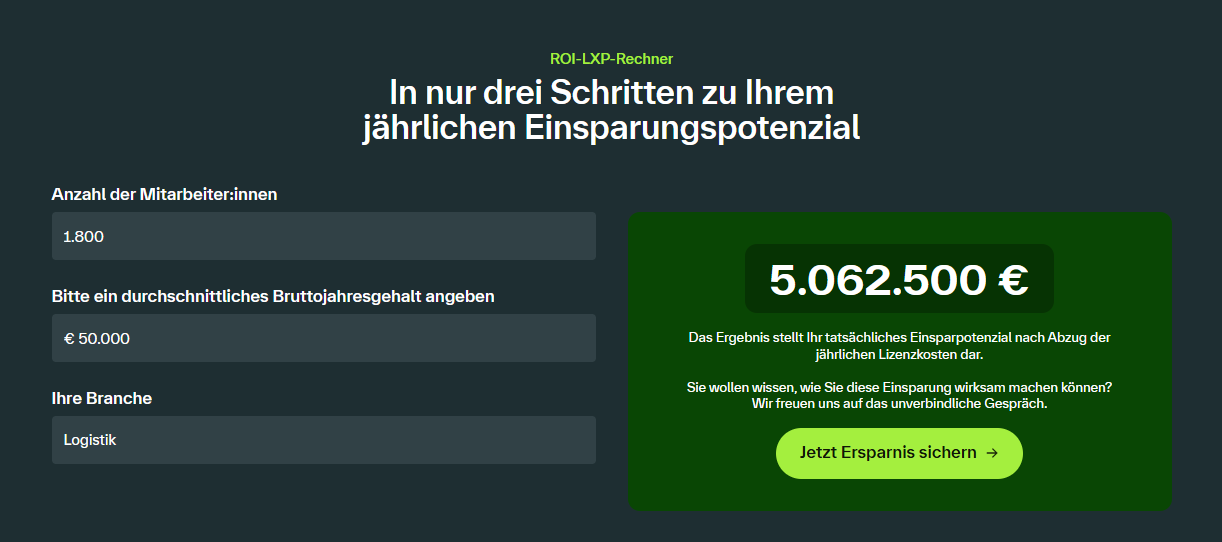What is a Learning Experience Platform (LXP)?

Who hasn't experienced the tired looks on employees' faces during mandatory training sessions? But that doesn't have to be the case. Learning Experience Platform LXP) is the name of the future and it puts an end to rigid course catalogs and focuses on personalized learning experiences. Read this article to find out how these digital learning worlds can inspire your employees and keep your company competitive.
What is an LXP? Definition and development of a modern learning platform
A Learning Experience Platform LXP) is a digital learning environment that focuses on self-directed, personalized learning. Using artificial intelligence, it recommends tailored learning content to users, analyzes learning progress, and promotes collaborative knowledge sharing. The focus is on the individual learning experience rather than pure course management.
Employees increasingly want to learn in a self-determined and flexible manner —preferably integrated directly into their everyday work. The Learning Experience Platform LXP) was developed in response to this need. It consistently places learners at the center of the entire learning process.
How does an LXP work?
An LXP access to a wide range of learning formats – from short videos to interactive courses. However, it is more than just a collection of learning content: it thinks for itself. Thanks to artificial intelligence, an LXP recommends customized content LXP and tracks and analyzes their learning progress. Similar to streaming services such as YouTube & Co., users receive recommendations for suitable learning content that is tailored precisely to their interests and professional profile. In addition, learners can create content themselves and share it with colleagues, which promotes the exchange of knowledge.
The resulting learning experiences are at the heart of LXP - after all, the "X" in LXP stands for "Experience". The goal behind it: Learning should be fun and make employees fit for the future through positive learning experiences.
Why an LXP: advantages for your company
A Learning Experience Platform offers numerous advantages that help companies to remain agile and fit for the future. These include
Designing efficient corporate communications
A recent McKinsey study shows:
Employees lose 1.8 hours a day searching for information.
This time can be LXP reduced by using an LXP . In an LXP , knowledge LXP bundled in one place and employees can access relevant content regardless of time and location. Whether in the office, working from home, or on the road—knowledge is always at your fingertips. This efficient distribution of knowledge throughout the company ensures that all employees are on the same page.
With the LXP, you Learning Experience Platform immediately see how much you Learning Experience Platform potentially Learning Experience Platform with a Learning Experience Platform and what measurable contribution learning makes to your company's return on investment.

Find out how you can improve your corporate communications with an LXP .
Closing the future readiness gap
Our knowledge becomes outdated faster than our smartphones. What is state-of-the-art today may be obsolete tomorrow. Artificial intelligence further accelerates this process. According to a McKinsey study, up to three million jobs in Germany could be fundamentally changed by the use of AI in the coming years until 2030.
These figures illustrate the growing "future readiness gap" – the gap between the current skills of employees and the future requirements of the labor market. An LXP companies close this gap. It offers customized learning paths, integrates the latest content at lightning speed, and promotes a culture of continuous learning. This enables companies to remain agile and their employees fit for the challenges of tomorrow.
Find out here how you can close the future readiness gap with an LXP .
Driving digital transformation forward
Germany is lagging behind in digitalization and ranks second to last in digital competitiveness among the G7 countries: a clear signal that there is a need to catch up in terms of processes, systems, and working methods. An LXP companies in catching up with customized learning paths. It creates the conditions for new technologies, tools, and digital processes to be actually used in the company. Different departments—from IT to marketing to sales—receive targeted learning opportunities tailored to their respective digital tasks. This optimally prepares employees for their respective challenges in the digital future.
Find out more about LXPs support for digital transformation.
Systematically developing digital skills
An LXP learning part of everyday life. Employees develop digital skills not only through predefined content, but also through user-generated content: they create their own learning materials such as videos, texts, or audio files and share their knowledge directly with colleagues. This creates a continuous, practical flow of knowledge within the company.
Personalized recommendations ensure that learning opportunities are targeted and that skills can be systematically developed. Learning thus becomes not a one-off measure, but a natural part of everyday work.
Discover how you can effectively develop digital skills with an LXP .
Sustainably increase sales performance
An LXP not only a learning tool, but also a powerful lever for your sales team, offering your sales staff numerous advantages: from specific training courses to sales techniques and product knowledge—everything is available in one place. Sales staff can thus prepare optimally for customer meetings or share their best practices with colleagues. This way, everyone benefits from each other's experiences.
You can find even more advantages of an LXP for your sales organization here.
Who benefits from an LXP?
All companies that want to advance their personnel development benefit from an LXP. With an LXP , they say goodbye to outdated "top-down" learning and instead promote self-directed, individual learning for all employees.
What core functions does an LXP offer?
Bundling knowledge, increasing learning speed and releasing potential - an LXP combines all of this. But how exactly does an LXP work? Here is an overview of the core functions:
- Personalized learning recommendations: Using artificial intelligence, the LXP analyzes LXP and recommends content that is tailored precisely to the interests and goals of the user.
- Skill mapping: This feature allows you to record learners' existing skills and identify skill gaps . This enables you to create targeted development plans.
- Content aggregation: Learning content from internal and external sources—from videos and articles to interactive e-learning courses —is bundled in one central location. This saves time and reduces the effort required to switch between different systems.
- Groups & Collaborative learning: Employees become teachers. They share their knowledge with colleagues and can learn LXP in the LXP , which promotes collaboration and knowledge transfer .
- Gamification elements: Learning becomes a game. Points, badges, and leaderboards increase learner motivation and transform mandatory tasks into an entertaining experience.
These functions create the technical basis for increasing motivation to learn , promoting knowledge exchange, and accelerating skills development in companies.
LXP Reporting and Analytics: Data-driven insights for optimal learning
LXP provide valuable insights into your employees' learning behavior and achievements, revealing what really interests them, where they get stuck, and when they take off. The learning analyses are presented LXP and clearly in dashboards in an LXP . This allows you to track key figures such as usage rates, course completions, or learning times, identify skill gaps, refine learning paths, and create personalized learning recommendations for employees.
LMS vs. LXP: the biggest differences at a glance
LMS and LXP - similar at first glance, but fundamentally different in detail. Both systems support in-company training, but pursue different approaches. The main difference lies in the focus: while an LMS acts as an organizational tool for learning content, an LXP is a personal learning support and knowledge network.
How do LMS LXP differ LXP terms of content creation?
In terms of content, the development is moving from rigid to dynamic. LMS rely on ready-made, internally created content that is managed by administrators. LXP , on the other hand, open the door to a variety of formats such as videos, articles and podcasts and offer an open platform for external resources.
Which learning approach suits which platform?
The learning approach also differs significantly: an LMS a structured, often linear learning path with predefined courses and content and is particularly well suited for mandatory training and compliance training. LXP on flexible, self-directed learning with personalized learning recommendations. In addition, Learners can create LXP learning content Learners an LXP and share it with other colleagues.
What characterizes the user interface of each platform?
LXPs and LMS focus on different aspects when designing their user interfaces in order to meet the respective requirements. LXPs offer a modern, intuitive design that promotes engagement and an inspiring learning experience. LMS , on the other hand, score points with a clear, functional interface and prioritize clarity, which is particularly helpful for structured learning processes and administrative tasks.
How is content prepared?
An LMS focuses on the structured provision of content without interactive elements. With an LXP , gamification elements are used to make the learning content interactive and fun.
All the important differences between an LMS and LXP at a glance:
Which LXP software is the right one?
Learning Experience Platform a Learning Experience Platform is a challenge. There is a wide variety of options available, and the decision needs to be carefully considered. What LXP the LXP when choosing an LXP ?
First of all, you should be clear about the company's objectives and requirements. What should employees learn? How should they learn it? Think about this in advance. Some important criteria that you should consider when making your decision are
- Personalization: A good LXP always offer personalized learning paths and diverse content to meet the different needs of learners. Videos, podcasts, interactive courses—all of this should be possible.
- User interface: Even the best software is of little use if it is not utilized. When selecting the appropriate LXP , ensure LXP an intuitive user interface that allows learners to navigate easily.
- Collaborative learning: Learning is not an individual sport! Enable your employees to actively contribute their knowledge. User-generated content should LXP a central component of your LXP . This allows employees to create their own content and share it with others.
- AI & modern technologies: Is the LXP ? Does it use modern technologies such as artificial intelligence, and are these used sensibly? Can the LXP be LXP integrated into existing systems? The LXP choice should be able to answer all these questions with a clear "yes."
By keeping these criteria in mind, you can make an informed decision and find the LXP that will really help your company move forward. Because only a well-thought-out choice will ensure that your employees not only learn, but also remain enthusiastic.
LXP in the company: 6 steps for a successful introduction
Introducing an LXP in the company requires some preparation and consideration. Important steps are
1. preparation and objectives
Preparation is the foundation LXP any successful LXP. Carefully analyze the learning needs of your employees. What do they want to learn? Where are the challenges? Define measurable goals that support both individual learning progress and company objectives. Also, formulate specific use cases to get a clear picture of how the LXP should be used LXP your company.
2. selection of the appropriate LXP
Compare different providers and make sure that the platform fits your corporate culture. Take the following into account
- User-friendliness
- functional diversity
- Integration options with existing systems.
You can find further selection criteria in the section "Which LXP is the right one?".
3rd test phase
Test the LXP with a small group of employees first. They can provide feedback and help to identify any problems before the broad roll-out.
4. provide content
Ensure that enough learning content is available to enable personalized learning. Review existing materials and identify relevant topics and knowledge gaps. Offer a diverse mix of formats such as videos, podcasts, and interactive modules to cater to the different learning styles of your users.
5. implementation
The introduction of an LXP should be well planned and carried out step by step. First of all, it is important to get all relevant stakeholders on board to ensure their support. Work closely with the IT department to ensure smooth technical integration and avoid data and information silos.
6. measure progress
Use the LXP's analysis functions to measure your employees' progress and continuously improve the platform. Gather feedback to adapt the learning platform where necessary and meet the needs of your employees.
Best practices for LXP: Insights from the Rheinische Post
Falling subscription figures and a stagnating digital business - the challenges posed by digitalization are clearly noticeable in the publishing industry. This is also the case at Rheinische Post. However, the company has set itself the goal of meeting these challenges and becoming a learning organization. How did it achieve this? With the introduction of the Haufe Learning Experience.
This platform has not only changed the accessibility and flexibility of learning, but has also taken employee motivation and commitment to a new level. Instead of rigid training formats, there are now tailored learning paths that meet the individual needs of employees.
"We are now up to date. Our employees have the opportunity to continue their training independently. This is a key foundation for modern working."
Jan Jansen, Head of Learning & Development at the Rheinische Post Media Group
Read the whole learning journey of the Rheinische Post here.
From the office to the workshop: LXP for white collar and blue collar employees
A Learning Experience Platform not a suit that only fits office workers. It is versatile and useful for everyone. Whether at a desk or a workbench, an LXP no boundaries. And that is a decisive advantage, especially in today's digital working world. After all, blue-collar employees such as craftsmen and factory workers, as well as white-collar employees such as managers and IT specialists, need technical and digital skills and soft skills and must continuously undergo further training.
- Blue-collar employees such as tradespeople or factory workers need quick access to specific information. With an LXP , they LXP use short learning content directly at their workplace and on the go to quickly and efficiently expand or deepen their skills.
- White-collar employees managers, accountants, and IT specialists must constantly adapt to rapid technological changes. With an LXP , they LXP from in-depth analyses, soft skills training, and flexible learning modules that can be easily integrated into their everyday office life.
A modern LXP both worlds and creates an inclusive learning culture that supports all employees and prepares them for the challenges of a changing world of work—regardless of job profile or traditional collar color.
LXP of the Haufe Akademie: The future of learning
The Haufe Akademie 's Learning Experience Platform offers you a modern solution for the individual training of your employees. Create customized learning content that is perfectly tailored to the needs and interests of your employees. A variety of interactive formats make learning not only efficient but also engaging. Your employees can network, exchange ideas and build knowledge together.
Additional systems can be integrated without any problems. The LXP be linked to other solutions such as learning management systems (LMS), intranets, or communication tools such as MS Teams and Slack. This makes the LXP central point of contact for continuing education in the company. External learning content from platforms such as Udemy or Coursera can also be integrated with little effort and shared with colleagues.

Use the Haufe Akademie's LXP to promote an inspiring learning culture in your company - for future-oriented and successful continuing education!
FAQ: Questions and answers about LXP
Are LMS & LXP compatible?
Yes, LMS and LXP are basically compatible and harmonize wonderfully with each other. The Haufe Akademie offers various integration options that ensure smooth cooperation between the two systems:
- Integration via the interface of an LMS
- Integration via the interface of our LXP
- For older LMS , we offer the option of storing files on a secure server
We would be happy to advise you personally.
Can I introduce an LXP without an LMS ?
Yes, you can! An LMS is not absolutely necessary for the introduction of an LXP. The LXP also works on its own.
Which companies are suited to a Learning Experience Platform?
An LXP for companies of all sizes that want to make learning more flexible, more individual, and closer to everyday work—regardless of whether they are white-collar or blue-collar jobs.
Haufe Akademie LXP Haufe Akademie also be used as a learning platform for third parties. As an on-demand learning solution, it enables, for example, the training of customers retailers on products and new offers. Haufe X360, a modern ERP platform, uses the LXP for successful partner management, LXP .
How does the tracking of verifiable learning content in the LXP work?
In many industries, companies are legally required to train their employees regularly and keep records of compliance with compliance guidelines. Companies can centrally manage and document training courses that require documentation in a Learning Experience Platform LXP). Learning content on compliance and sustainability topics can be seamlessly integrated and assigned to employees in a targeted manner.
To fulfill this obligation, we offer the Compliance College and the Sustainability College . These include numerous courses on all relevant topics related to compliance and sustainability.
The seamless integration of both colleges into your LXP not only makes it easier for you to document training courses, but also ensures that your employees are always up to date with the latest legal requirements.
You might also be interested in










